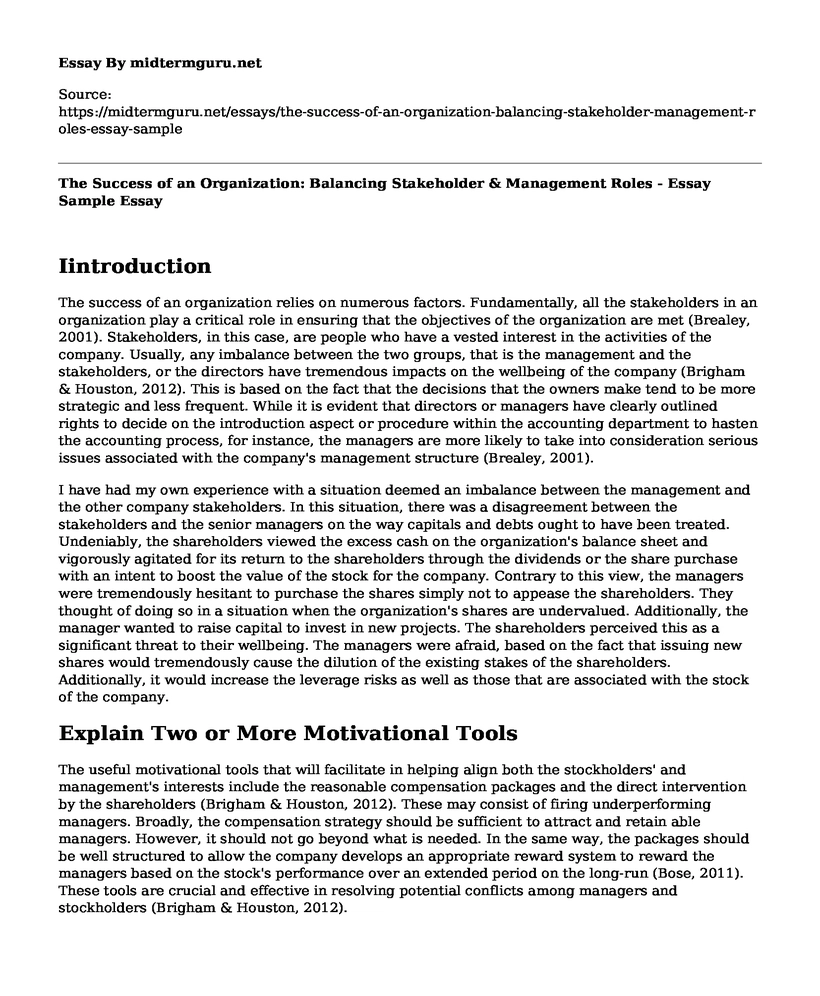Iintroduction
The success of an organization relies on numerous factors. Fundamentally, all the stakeholders in an organization play a critical role in ensuring that the objectives of the organization are met (Brealey, 2001). Stakeholders, in this case, are people who have a vested interest in the activities of the company. Usually, any imbalance between the two groups, that is the management and the stakeholders, or the directors have tremendous impacts on the wellbeing of the company (Brigham & Houston, 2012). This is based on the fact that the decisions that the owners make tend to be more strategic and less frequent. While it is evident that directors or managers have clearly outlined rights to decide on the introduction aspect or procedure within the accounting department to hasten the accounting process, for instance, the managers are more likely to take into consideration serious issues associated with the company's management structure (Brealey, 2001).
I have had my own experience with a situation deemed an imbalance between the management and the other company stakeholders. In this situation, there was a disagreement between the stakeholders and the senior managers on the way capitals and debts ought to have been treated. Undeniably, the shareholders viewed the excess cash on the organization's balance sheet and vigorously agitated for its return to the shareholders through the dividends or the share purchase with an intent to boost the value of the stock for the company. Contrary to this view, the managers were tremendously hesitant to purchase the shares simply not to appease the shareholders. They thought of doing so in a situation when the organization's shares are undervalued. Additionally, the manager wanted to raise capital to invest in new projects. The shareholders perceived this as a significant threat to their wellbeing. The managers were afraid, based on the fact that issuing new shares would tremendously cause the dilution of the existing stakes of the shareholders. Additionally, it would increase the leverage risks as well as those that are associated with the stock of the company.
Explain Two or More Motivational Tools
The useful motivational tools that will facilitate in helping align both the stockholders' and management's interests include the reasonable compensation packages and the direct intervention by the shareholders (Brigham & Houston, 2012). These may consist of firing underperforming managers. Broadly, the compensation strategy should be sufficient to attract and retain able managers. However, it should not go beyond what is needed. In the same way, the packages should be well structured to allow the company develops an appropriate reward system to reward the managers based on the stock's performance over an extended period on the long-run (Bose, 2011). These tools are crucial and effective in resolving potential conflicts among managers and stockholders (Brigham & Houston, 2012).
How Selected Tools Are Effective in Resolving Potential Conflicts
The conflicts between managers and shareholders is not a new thing. However, organizations must strive towards striking a good balance between the interests of the shareholders and managers. The issues surrounding compensation, prices of the shares, and dividends must be treated with the utmost care. Based on the fact that the inherent value within an organization is not observable, the compensation must always be based on the prices at the stock market. However. The price used should be an average over time instead of a specific date. As such, the intervention by the stakeholders should be direct with the managers.
References
Brigham, E. F., & Houston, J. F. (2012). Fundamentals of financial management. Cengage Learning.
Brealey, R. A. (2001). Fundamentals of corporate finance. McGraw Hill.
Bose, D. C. (2011). Fundamentals of financial management. PHI Learning Pvt. Ltd.
Cite this page
The Success of an Organization: Balancing Stakeholder & Management Roles - Essay Sample. (2023, Jan 26). Retrieved from https://midtermguru.com/essays/the-success-of-an-organization-balancing-stakeholder-management-roles-essay-sample
If you are the original author of this essay and no longer wish to have it published on the midtermguru.com website, please click below to request its removal:
- Essay on Managing Staff in High-Risk Countries
- Ratios and Financial Planning in Tuxedo Air Inc - Paper Example
- Data Analytics and Financial Impact of Optum Lab - Essay Sample
- Cloud Computing: Unlocking Business Potential and Streamlining Operations - Research Paper
- Political Action Committees: Raising Funds for Political Candidates - Essay Sample
- Demarco: Balancing Care for Environment, Country & Employer - Essay Sample
- Universities & Colleges: Driving Technological & Societal Change - Essay Sample







